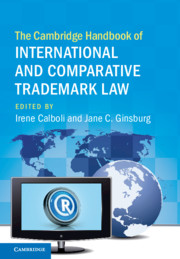Book contents
- The Cambridge Handbook of International and Comparative Trademark Law
- The Cambridge Handbook of International and Comparative Trademark Law
- Copyright page
- Contents
- Editors and Contributors
- Foreword
- Preface
- Part One International Aspects of Trademark Protection
- Part Two Comparative Perspectives on Trademark Protection
- I The Nature and Functions of Trademarks
- II Signs That Can Be Protected as Trademarks
- III Public Policy Limitations of Trademark Subject Matter
- IV The Relationship between Trademarks and Geographical Indications
- V Certification and Collective Marks
- VI The Relationship between Trademark Law and Advertising Law
- VII The Relationship between Trademark Law and the Right of Publicity
- VIII Trademarks and Domain Names
- IX Overlapping Rights
- X Theories Underlying the Standards for Trademark Infringement
- XI Trademark Dilution
- XII Secondary Trademark Liability
- XIII Trademark Defenses
- 33 Valuing the Freedom of Speech and the Freedom to Compete in Defenses to Trademark and Related Claims in the United States
- 34 Limitations to Trademark Protection as Defences to Infringement
- XIV The Principle of Exhaustion of Trademark Rights
- XV Trademark Transactions
- Index
34 - Limitations to Trademark Protection as Defences to Infringement
from XIII - Trademark Defenses
Published online by Cambridge University Press: 18 September 2020
- The Cambridge Handbook of International and Comparative Trademark Law
- The Cambridge Handbook of International and Comparative Trademark Law
- Copyright page
- Contents
- Editors and Contributors
- Foreword
- Preface
- Part One International Aspects of Trademark Protection
- Part Two Comparative Perspectives on Trademark Protection
- I The Nature and Functions of Trademarks
- II Signs That Can Be Protected as Trademarks
- III Public Policy Limitations of Trademark Subject Matter
- IV The Relationship between Trademarks and Geographical Indications
- V Certification and Collective Marks
- VI The Relationship between Trademark Law and Advertising Law
- VII The Relationship between Trademark Law and the Right of Publicity
- VIII Trademarks and Domain Names
- IX Overlapping Rights
- X Theories Underlying the Standards for Trademark Infringement
- XI Trademark Dilution
- XII Secondary Trademark Liability
- XIII Trademark Defenses
- 33 Valuing the Freedom of Speech and the Freedom to Compete in Defenses to Trademark and Related Claims in the United States
- 34 Limitations to Trademark Protection as Defences to Infringement
- XIV The Principle of Exhaustion of Trademark Rights
- XV Trademark Transactions
- Index
Summary
True to its free market origins, the EU Trade Mark Directive (TMD)1 allows any sign to be registered as long as it is acting as a badge of origin and as long as it does not fall into one of the absolute grounds for refusal of registration. Some bars to registration cannot be overcome, such as those prohibiting the registration of functional shapes or signs that offend against public morality. However, other signs, which are descriptive, non-distinctive or generic, while disallowed from immediate registration, can subsequently be registered provided they have acquired distinctiveness through use. The EU trademark regime thus allows for the registration of signs that under previous laws of member states might have been denied registration in the public interest. For instance, in the United Kingdom and in Germany, this category included signs that were distinctive but, the courts held, should be left free for others to use, such as geographical names.2 For the same reason, under its 1938 Trade Marks Act, the UK courts would not allow the registration of functional and non-functional shape marks even with acquired distinctiveness.
- Type
- Chapter
- Information
- Publisher: Cambridge University PressPrint publication year: 2020

